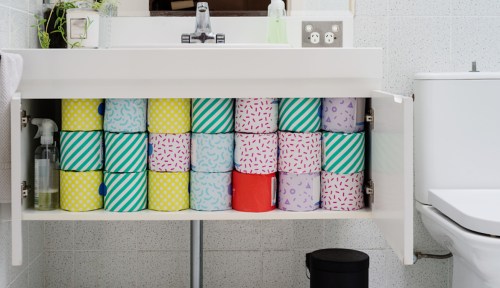If You Feel a Sudden Urge To Pee Right When You Get Home, You Might Have ‘Latchkey Incontinence’
Latchkey incontinence is a non-medical term to describe the urge to suddenly having to go pee as soon as your home is in sight.

There’s actually a non-clinical term for having to pee immediately upon returning home, says Aleece Fosnight, PA-C, a physician’s assistant who specializes in sexual health and women’s urology at Aeroflow Urology, and it’s known as “latchkey incontinence” or even “key in the door incontinence.” This refers to the repeated, sudden urge to pee when you pull into the driveway or get within an eyeshot of your front door.
Experts in This Article
urology and women’s health specialist at Aeroflow Urology
“Although we don’t use this term for a medical diagnosis, it is a common term used with patients to help them understand the symptoms they are experiencing,” says Fosnight. The good news is having to go to the bathroom when you get home isn’t necessarily a problem. It makes sense, says Fosnight, because your bathroom is familiar and potentially a safer space for you compared to public restrooms. However, if it’s a consistent pattern, it can tell you some important information about your bladder health.
Is it normal to need to pee as soon as you get home?
Some people may not be comfortable using the restroom in public– for example, trans folks may not feel safe in either gender-designated restroom. Regardless of the reason, holding your pee while you’re out all day or at work can create a huge rush to the bathroom when you get home. “Unless you have been out of the house for several hours, going to the bathroom to urinate right when you get home is not typically normal,” says Fosnight.
Whether or not you are just arriving home or just arriving at the gas station should not change your urinary urge, Heather Jeffcoat, DPT, a Los Angeles pelvic floor doctor and founder of Fusion Wellness PT. Still, like clockwork, some people really do get this urge.
So, what makes someone need to pee when they get home?
Basically, your body gets used to going when you arrive home. Think about this: The “just in case” pee before you go out or holding your pee until the moment you get home can train your brain to look for triggers that it is time to pee, Fosnight, explains. After all, the bladder is controlled by the brain.
“This latchkey phenomenon occurs secondary to your brain training your bladder to associate your home (or an object that reminds you of home) with needing to use the restroom,” says Fosnight.
How often should you pee throughout the day?
Urinating anywhere from four to 10 times a day is perfectly normal, according to the Cleveland Clinic. Ideally, people shouldn’t have pee unless their bladder is full enough to trigger that urge, says Dr. Jeffcoat. If you’re looking for hard parameters around what that means, Dr. Jeffcoat says your flow should last for about eight seconds. If you’re experiencing latchkey incontinence and peeing for less than that time, she recommends resisting those just-got-home urges to retrain your brain.
Not all urinary issues benefit from resisting the urge to pee, so it’s best to talk with your doctor before trying this out. But in certain instances, like latchkey incontinence or frequent urges when your bladder isn’t full (i.e., overactive bladder), retraining the brain in this way is often recommended.
What should you do if you’re experiencing latchkey incontinence?
As mentioned, you can train your brain and bladder to not have to go the second you get home, says Fosnight. The goal is to break that pattern, so rather than head straight to the restroom when you get home, delay that activity by grabbing the mail first, fixing a snack, talking to your family, or petting your cat. Fosnight says this can take some time, so you may need to gradually increase the minutes from when you get home to when you visit the restroom.
Seeing a provider about your concerns is always a good idea as well, says Dr. Jeffcoat, especially if you’re changing your behavior and the urges are not changing. You can see a primary care provider who might recommend you see a urologist or a pelvic floor therapist. “Some people go 10 to 12 times per day, but they don’t think it’s disruptive to their day-to-day life, so only seek help if you see it as a problem,” says Fosnight.
One other way to improve that latchkey urgency? Fosnight says to try to avoid constipation, as a stool in your colon and lower intestines can put pressure on your bladder, which sends out those phantom urges.
Sign Up for Our Daily Newsletter
Get all the latest in wellness, trends, food, fitness, beauty, and more delivered right to your inbox.
Got it, you've been added to our email list.










